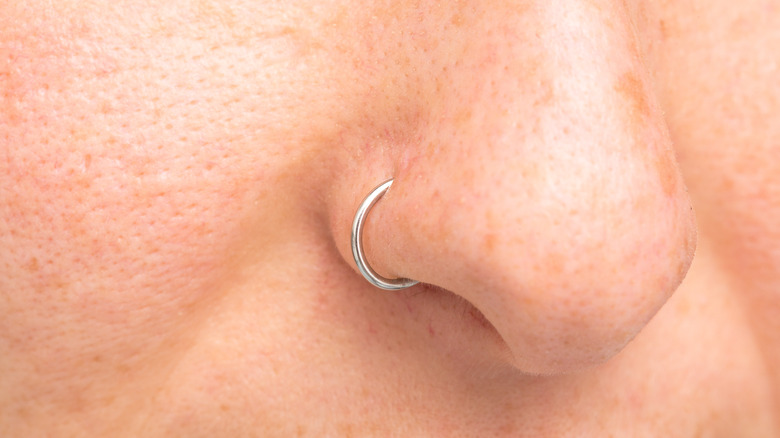Things You Should And Shouldn't Do When Cleaning Nose Piercings
When you have a new nose piercing, it's always a good idea to know exactly what you should and shouldn't do when it comes to cleaning. While good hygiene and keeping the touching to a minimum (after all, you do touch a lot of really gross things in a day) is a given, Refinery29 reports that a daily nose cleaning routine is crucial to avoid infection and other nasties.
According to Brian Keith Thompson, owner of Body Electric in Los Angeles, cleaning your new nose piercing is simple. Sharing his expertise with Refinery29, the celebrity piercer advises that the best way to avoid infection is to use a small amount of gentle, fragrance-free cleanser to clean the skin surrounding the piercing. There's no need to twist or otherwise move your new piercing, he says. To dry, Thompson recommends dabbing a bit of paper towel to soak up any residue, then spraying the piercing with a saline solution, which you can usually buy at your local drugstore.
Never over-clean your nose piercing
While cleaning your nose piercing using Thompson's method may seem straight forward, always be sure to monitor your piercing to see how it reacts to things. Infinity Body Piercing Inc. claims certain products can cause a reaction or irritation no matter how gentle, so it's best to keep your piercing front of mind and avoid over-cleaning. Stay away from alcohol, peroxide, and antibiotic creams as they are often too harsh for the skin, and don't even think about using cotton swabs or cotton balls to clean the area. As Thompson explained to Refinery29, microfiber or cotton cloths can snag the jewelry, while the fiber in cotton swabs and cotton buds can get stuck in the actual piercing.
According to Healthline, nose piercings can take a few months to heal, at which point you only need to clean the area with saline solution when the piercing is dirty or oily. If you do find yourself with a nose piercing infection of any kind, or you notice bleeding, swelling, or scarring, the NHS suggests contacting your doctor immediately. In rare cases, an infection left untreated can lead to blood poisoning or toxic shock syndrome.

